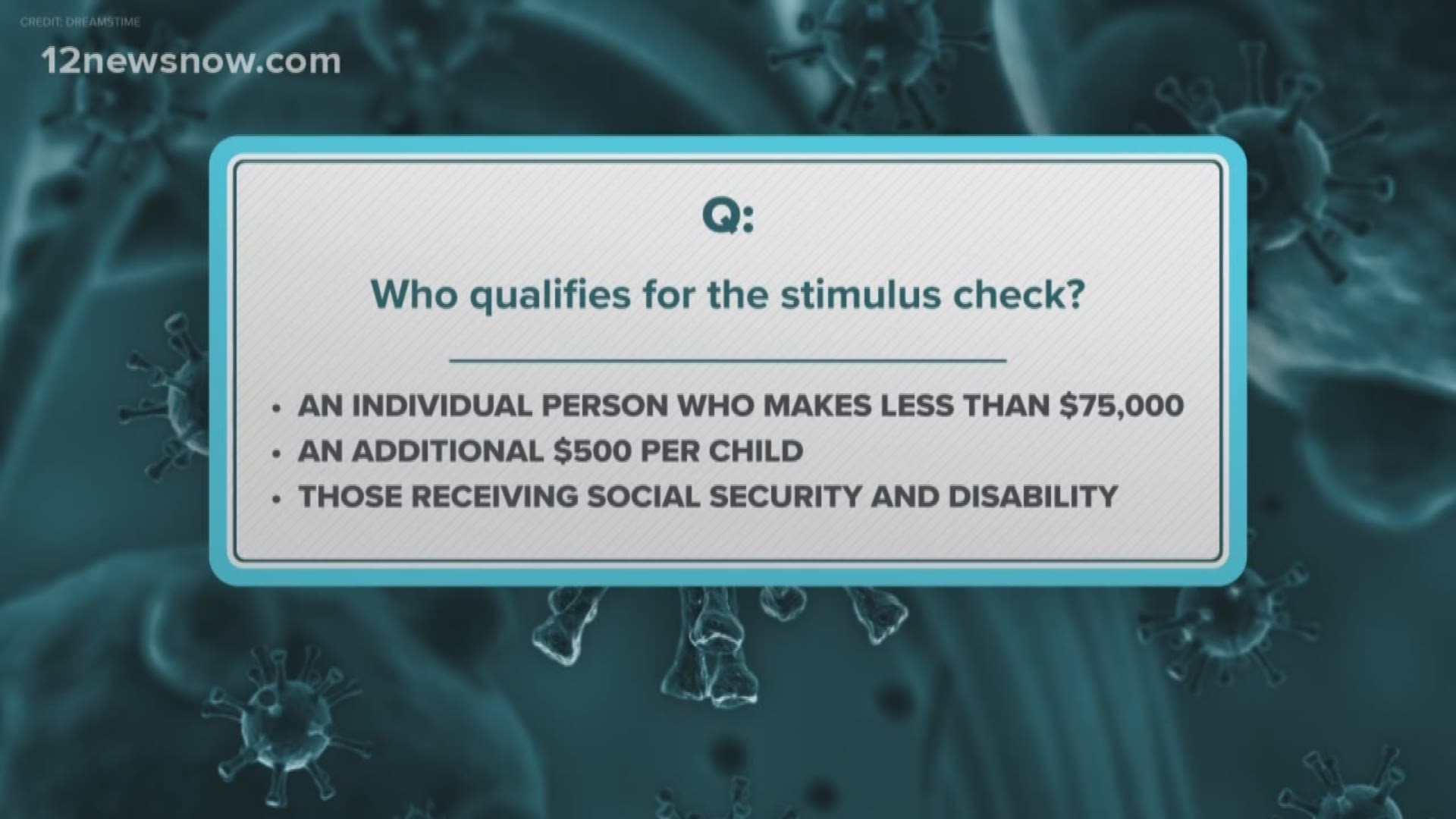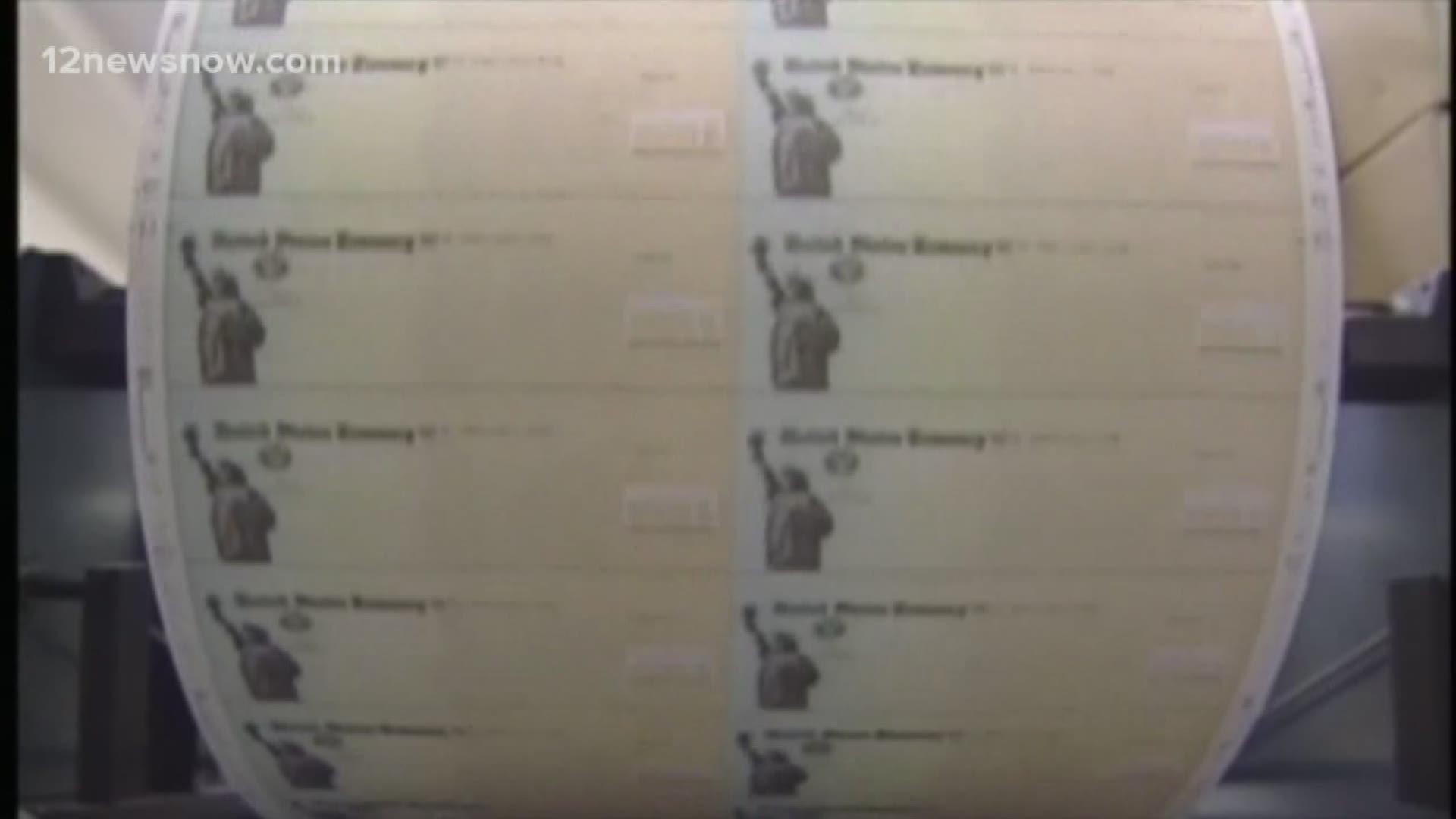BEAUMONT, Texas — The coronavirus pandemic is more than just case numbers, death tolls and hospital bed counts.
It is something that has touched every family across Southeast Texas. And now that it is the first of the month, the grim reminder that bills are due.
The good news is there is help available. And 12News is working hard to make sure you have the information and resources available to help you make that car payment, mortgage payment and all those other monthly bills that are stacking up.
WHO QUALIFIES FOR THE STIMULUS CHECK?
The IRS and the Treasury Department say Americans will start receiving their economic impact checks in the next three weeks.
- Anyone earning up to $75,000 & has a Social Security number will receive a $1,200 payment.
- Couples making under $150,000 will receive $2,400
- Payments steadily declines for those who make higher incomes and anyone earning more than $99,000 (individual) or $198,000 (joint filers) are not eligible.
- Parents will receive $500 for each qualifying child
The money will be directly deposited in your bank account if the government has that information from your tax return.
If you haven’t filed your 2019 taxes, the government will use information from your 2018 taxes to calculate your payment and determine where to send it. It can use your Social Security benefit statement as well.
People who are not required to file a tax return — such as low-income tax payers, some senior citizens, Social Security recipients, some veterans and people with disabilities — will need to file a very simplified tax return to receive the economic impact payment. It provides the government basic details including a person’s filing status, number of dependents and direct-deposit bank information.
UTILITIES
Gas, electric, and other utility providers often have assistance programs for customers who cannot pay in full. There are also government and charitable programs to help low-income or struggling households. Ask the utility provider for referrals or call 2-1-1 for help finding local social service programs or charities. Several cities and regions have opted to halt utility shutoffs.
MORTGAGE HELP
Numerous mortgage lenders have said they are willing to work with distressed borrowers, including potentially suspending or reducing payments. Contact them immediately to find out about your options.
If you hold a mortgage backed by Fannie Mae or Freddie Mac — about half of all mortgage holders do — there is help. The mortgage buyers have suspended all foreclosures and evictions for homes owned by their companies.
They've also expanded their forbearance program, which could suspend payments for up to a year. Ask the company you make your payments to if you hold a Fannie or Freddie loan.
The recently passed $2 trillion stimulus package allows property owners to defer federally backed mortgages for 90 days — if they halt evictions and late fees for that period — but the relief doesn’t address other kinds of mortgages.
But Sandy Rollins, executive director of the Texas Tenants' Union, told The Texas Tribune that there’s no guarantee that landlords will pass that relief on to tenants.
As for the promised $1,200 stimulus check, some won’t receive it: Anyone claimed as a dependent — which applies to most college students and many elderly and disabled people — is out of luck. For those who are eligible, it’s unclear when the one-time payment will make it to them or how long it can stretch.
The new law does offer some additional protections for those living in subsidized housing.
RELATED: FEMA extends flood insurance renewal policies to help customers affected by COVID-19 pandemic
HELP FOR RENTERS
Renters' fate depends on where they live and who they rent from. Reach out to your landlord or property management company to ask for leniency.
Most evictions are halted across Texas until at least April 20, thanks to a Texas Supreme Court order, but landlords are still posting notices to vacate and threatening to kick out renters after the moratorium elapses, Zoe Middleton of Texas Housers told the Texas Tribune.
“[Rent notices] change in tones, but they are all pretty insistent on the fact that rent is due and you will be not living there if you don’t pay,” said Middleton, the southeast director of the affordable housing advocacy organization.
But an eviction moratorium isn’t a cure-all. Tenants are still worried about racking up late fees in the meantime and having to back pay several months of rent when the state and city orders lift.
Some cities and counties have opted to ban evictions for even longer than the Texas Supreme Court has ordered.
“The new law buys everyone valuable time,” Casar tweeted, referring to Austin’s grace period. “In 60 days, some families will recover. Others won’t. That’s why we’re working on a big rental assistance program in coming days to support the new law [and] fight to ensure no one loses their home.”
STUDENT LOANS
Federal loan borrowers can now seek an emergency administrative forbearance, which would allow them to postpone payments for up to 60 days. Borrowers must contact a servicer to apply.
The federal government also lowered the interest rate on all federally held student loans to 0%. However, that will not lower the monthly payment; instead it will apply the payment entirely to the principle balance.
The government has also temporarily halted collections and wage garnishment for borrowers who've fallen behind on their federal student loans. It has instructed private collection agencies to follow suit.
If you have private student loans, contact your servicer for their repayment options.
The Texas Tribune is a nonpartisan, nonprofit media organization that informs Texans — and engages with them – about public policy, politics, government and statewide issues.


